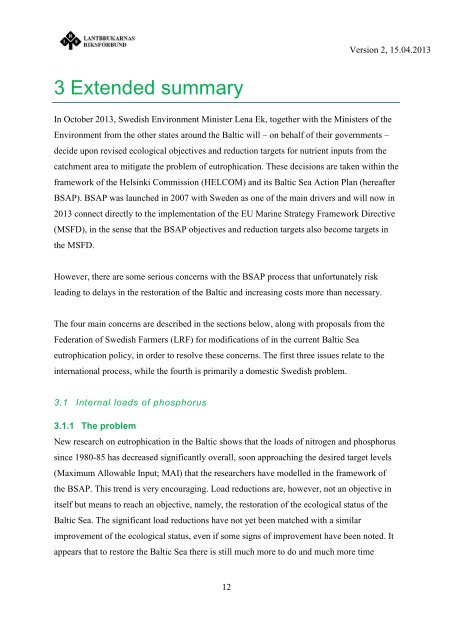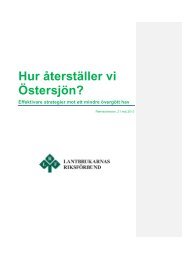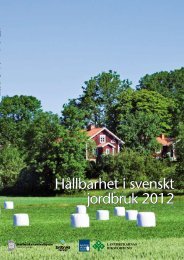LRFrapport_2013015
LRFrapport_2013015
LRFrapport_2013015
You also want an ePaper? Increase the reach of your titles
YUMPU automatically turns print PDFs into web optimized ePapers that Google loves.
3 Extended summary<br />
12<br />
Version 2, 15.04.2013<br />
In October 2013, Swedish Environment Minister Lena Ek, together with the Ministers of the<br />
Environment from the other states around the Baltic will – on behalf of their governments –<br />
decide upon revised ecological objectives and reduction targets for nutrient inputs from the<br />
catchment area to mitigate the problem of eutrophication. These decisions are taken within the<br />
framework of the Helsinki Commission (HELCOM) and its Baltic Sea Action Plan (hereafter<br />
BSAP). BSAP was launched in 2007 with Sweden as one of the main drivers and will now in<br />
2013 connect directly to the implementation of the EU Marine Strategy Framework Directive<br />
(MSFD), in the sense that the BSAP objectives and reduction targets also become targets in<br />
the MSFD.<br />
However, there are some serious concerns with the BSAP process that unfortunately risk<br />
leading to delays in the restoration of the Baltic and increasing costs more than necessary.<br />
The four main concerns are described in the sections below, along with proposals from the<br />
Federation of Swedish Farmers (LRF) for modifications of in the current Baltic Sea<br />
eutrophication policy, in order to resolve these concerns. The first three issues relate to the<br />
international process, while the fourth is primarily a domestic Swedish problem.<br />
3.1 Internal loads of phosphorus<br />
3.1.1 The problem<br />
New research on eutrophication in the Baltic shows that the loads of nitrogen and phosphorus<br />
since 1980-85 has decreased significantly overall, soon approaching the desired target levels<br />
(Maximum Allowable Input; MAI) that the researchers have modelled in the framework of<br />
the BSAP. This trend is very encouraging. Load reductions are, however, not an objective in<br />
itself but means to reach an objective, namely, the restoration of the ecological status of the<br />
Baltic Sea. The significant load reductions have not yet been matched with a similar<br />
improvement of the ecological status, even if some signs of improvement have been noted. It<br />
appears that to restore the Baltic Sea there is still much more to do and much more time




